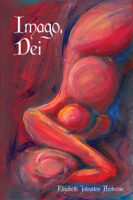Book Review :: Imago, Dei by Elizabeth Johnston Abrose

Guest Post by Nicholas Michael Ravnikar
With a comma that interrupts a Latin phrase etched in Christian history, Elizabeth Johnston Abrose’s Imago, Dei offers disjunction to give worn tropes new context. This deliberate juxtaposition rejuvenates the flat and stale of tradition.
A cycle of eighteen poems in free verse, the collection’s pieces each center in the third person on an unnamed female. Like the larva that becomes caterpillar that becomes chrysalis to become an adult – or imago – moth or butterfly, she is both identical with and different from her other incarnations.
Cited quotations in epigraph from both entomological and biblical literature underscore a tone of scholarly detachment and/or posture of dissociation. References to insects in the garden spin a theme of metamorphosis to encompass, which reinvigorates the classical Greek spiritual depiction of Psyche as butterfly.
Across its arc, the chapbook teases out narrative threads of youth marked by all-too-common traumas of evangelical Christianity: shamed sexuality, abuse masquerading as discipline in the guise of the father, a concomitant confusion of pain with love. For those considering such traumas from personal experience to reflect on the substance of religion’s impact on their lives, this collection, while perhaps triggering, may serve to reaffirm and validate.
Imago, Dei by Elizabeth Johnston Ambrose. Rattle Poetry, February 2022.
Nicholas Michael Ravnikar is a neurodivergent writer of poems, plays and fiction who is presently disabled. Previously employed as a college prof, copy editor, bathtub repair technician, substance abuse prevention agency success coach and marketing specialist, he lives in Racine, WI with his partner and their children. Connect with him on social media and get free chapbooks at bio.fm/nicholasmichaelravnikar.




